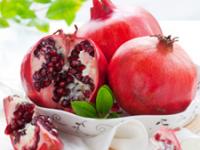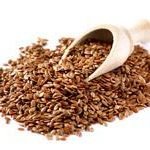Supplementing with pomegranate makes sense if you are looking at cancer prevention, heart health, reducing bad cholesterol, lowering blood pressure, and protecting against aging.
The pomegranate has been consumed and used for thousands of years. It is even believed by some that the pomegranate is the fruit that grew in the Garden of Eden, and not actually the apple. Literally meaning seeded apple, the pomegranate is one of the world’s most popular fruits. When you look a little closer, it’s easy to see why.
Pomegranate Anti-Cancer Benefits
In the past few years, studies of pomegranates have shown components that inhibit skin cancer, breast cancer, prostate cancer, colon cancer and leukemia. This comes from the fact that pomegranate juice, as the TV ads say, is an antioxidant powerhouse, packed with both the polyphenols that have made red wine and green tea famous and the ellagitannins that have made red raspberries one of the hottest food items in the anti-cancer arsenal. In fact, a glass of pomegranate juice has more antioxidants than a glass of red wine, green tea, grape juice, blueberry juice, cranberry juice, acaí juice, or orange juice. Not surprising when one pomegranate contains about 40 percent of an adult’s recommended Vitamin C intake.
Pomegranate for Heart Health
Pomegranate may play a role in heart health as well. This is due to a compound called punicalagin that is found only in pomegranates. This compound helps lower cholesterol and blood pressure, as well as helps with atherosclerosis (a thickening of the arterial walls associated with plaque build-up in the arteries).
Pomegranate for Women’s Health
Scientists also think the compounds in pomegranates may play a role in regulating estrogen levels and menstrual and menopausal symptoms (learn more about women’s health issues and remedies). This means that pomegranate might help reduce cramping, mood swings, hot flashes, and so on.
More Natural Health Benefits of Pomegranate
And then there are all the other benefits associated with the fruit — and there are plenty of those. Consider these interesting findings:
- According to an article in the Journal of Clinical Nutrition, people who drink just two ounces of pomegranate juice a day for a week increase antioxidant activity by some nine percent.
- A study published in the American Journal of the College of Cardiology found that in just three months, drinking a cup of pomegranate juice daily improves the amount of oxygen getting to the heart muscle of patients who had heart disease.
- Studies also have found that pomegranate juice may prevent skin and lung cancer.
- Other conditions that show improvement after consuming pomegranate include erectile dysfunction, arthritis, dental plaque, and diarrhea.
- Plus, pomegranate juice is antibacterial and antiviral.
Pomegranates have also been used to help:
- improve the skin (fights wrinkles and gives healthy glow)
- speed up wound healing and prevent scars
- reduce the risk of premature birth
- fight menopausal fatigue
- treat cataracts as eye drops
- treat diarrhea
- treat nose bleeds
How to Take Pomegranate
Supplementation with pomegranate extract makes sense if you are looking at cancer prevention, maintaining a healthy heart, reducing bad cholesterol, lowering blood pressure, and protecting against free radicals and aging. Not bad for a piece of fruit.
To enjoy pomegranate seeds’ nutrition and benefits, you can drink pomegranate juice (but make sure it isn’t sweetened, and raw chilled juice is best — not pasteurized), take pomegranate extract supplements, peel the fruit and eat it, or take it as part of a superfood formula, such as Jon Barron’s Private Reserve Superfood formula.
By the way, here’s a trick for getting the edible pomegranate seeds out of the fruit in less than a minute.









pomegranate for cataracts
Where can I go to learn about treating cataracts with pomegranate drops?
Thank you, Ed Neubauer
Pomegranate
Go to Health food store to buy “Pomegranate Juice concentrate; add these drops to water; drink the juice.0aily;
Pomegranot seeds
Do you just throw all those seeds out?
Pomegranate
Yea; do you eat the seeds; what about the pulp and rind? I used to take the seeds and “eat the gel around the seeds; makes my lip “ruby red”; I thank all who grow The Pomegranate Tree.;
Pomegranate
I admire your in depth study and numerous references. Thanks to the Almighty pomegranate is plentiful in India. Most of the houses in small towns have a tree in the yard. It doesn’t demand much water too.
Our good old Ayurvedic system is all praise for many such fruits which are being rediscovered!
Pomegranate
The Pomegranate is “The Indian Apple”; known for ages; at~